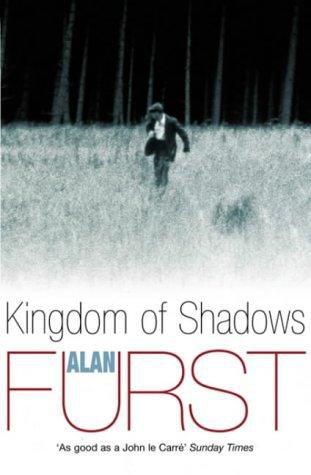
Kingdom of Shadows
Night Soldiers Series, Book 6
کتاب های مرتبط
- اطلاعات
- نقد و بررسی
- دیدگاه کاربران
نقد و بررسی

Starred review from January 1, 2001
The desperation of "stateless" people trying to escape the Nazi redrawing of the European map in the late 1930s pervades Furst's (Night Soldiers; Red Gold, etc.) marvelous sixth espionage thriller. On a rainy night in 1938, the train from Budapest pulls into Paris bearing Nicholas Morath, a playboy Hungarian expatriate and sometime spy for his uncle, a wealthy Hungarian diplomat based in the French capital. Morath, a veteran hero of the Great War and a Parisian for many years, now finds himself forced to rely on former enemies to try to rescue Eastern European fugitives displaced by Hitler's aggression. His eclectic circle includes a Russian gangster, a pair of destitute but affable near-tramps, and a smooth-talking SS officer. Smuggling forged passports, military intelligence documents and cash through imminent war zones, Morath time and again returns in thankless triumph to the glittering salons of Paris. Furst expertly weaves Morath's apparently unconnected assignments into the web of a crucial 11th-hour international conspiracy to topple Hitler before all-out war engulfs Europe again, counterbalancing scenes of fascist-inspired chaos with the sounds, smells and anxieties of a world dancing on the edge of apocalypse. The novel is more than just a cloak-and-dagger thrill ride; it is a time machine, transporting readers directly into the dread period just before Europe plunged into its great Wagnerian g tterd mmerung. This is Furst's best book since The Polish Officer, and in it he proves himself once again a master of literary espionage.

September 1, 2000
Debonair Nicholas Morath, a Hungarian migr, is living the high life in Paris until the Hungarian Resistance taps him to help counter Hitler's growing threat.
Copyright 2000 Library Journal, LLC Used with permission.

Starred review from November 15, 2000
\deflang1033\pard\plain\f4\fs24 "On the tenth of March 1938, the night train from Budapest pulled into the Gare du Nord a little after four in the morning." To readers of historical espionage fiction, that sentence can mean only one thing: Alan Furst. Furst writes about the years from 1938 to 1941 as if they were recurring characters, and over the course of five books, he has laid permanent claim to that period as his own. His latest tale concerns a Hungarian aristocrat, Nicholas Morath, who is living a life of easy indolence in prewar Paris. The only disturbance to his round of dinner parties and late-night romantic assignations is the occasional secret mission to Hungary at the behest of his diplomat uncle. Morath treats these forays more as familial obligation than as patriotic duty, but as Hitler's march across Europe continues, he finds himself slipping further into the shadow world of secret agents. What Furst does so convincingly--beyond the razor-sharp evocation of period and place--is capture the moral ambiguity at the heart of the lapsed cynics who are his heroes. Morath's commitment, like Jules Casson's in \plain\f4\fs24" Red Gold \plain\f4\fs24 (1999), is to individual rather than national values, even to hedonism rather than patriotism, yet he is pulled into the conflict anyway. Morath and Casson take tremendous risks, even act heroically, but they do it with a kind of tired resignation, as if an undertow were pulling them down. That's not to say they aren't romantic--you can't light a cigarette on a dark Paris street in 1938 without being romantic--but they are also utterly unsentimental. That is Furst's genius: he portrays what is perhaps the twentieth-century's most terrifying yet perversely romantic period without letting the romance turn the terror into sentimental goo. (Reprinted with permission of Booklist, copyright 2000, American Library Association.)

























دیدگاه کاربران